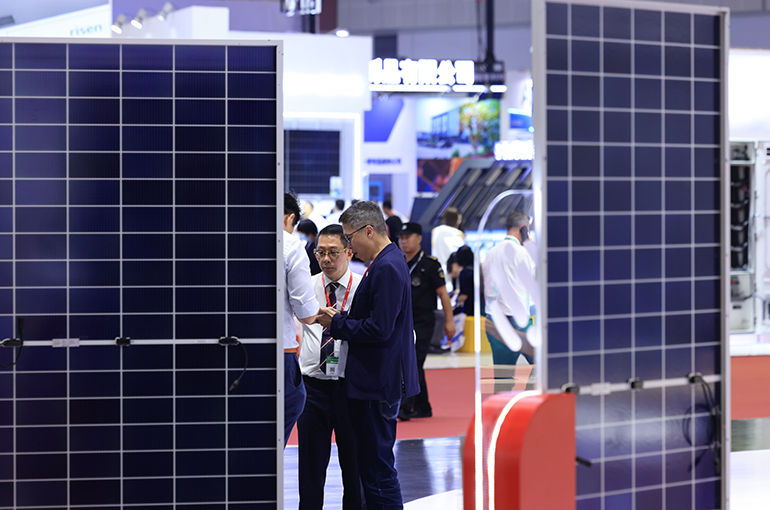 Tariff Spat to Have Minimal Impact on China’s Solar Sector, Bosses Say
Tariff Spat to Have Minimal Impact on China’s Solar Sector, Bosses Say(Yicai) May 14 -- Recent trade tensions between China and the United States are expected to only have a limited impact on China’s solar industry, as relatively few photovoltaic products are exported directly to the US and as some companies have already built up sufficient inventory there, industry executives said yesterday.
US tariff hikes won’t affect Trina Solar’s operational costs in the US this year, Chairman and Chief Executive Officer Gao Jifan said at the 2024 performance briefings of five listed solar companies hosted by the Shanghai Stock Exchange.
Trina Solar has already amassed a large stock of solar modules in the US, Gao said. There is also more still in transit and on top of this the Changzhou-based firm has other supply channels, so this should ensure that it can meet US customer demand throughout 2025, Gao said.
Trina Solar’s joint venture factory in Indonesia can produce one gigawatt of solar panels a year. The country is exempt from US anti-dumping and countervailing duties, which instead target the PV products of four other Southeast Asian nations, and so this plant retains a competitive edge, Gao said.
“If US-China tariff tensions ease, this will create a more stable trade environment for solar and energy storage products,” said Li Xiande, chairman of Jinko Solar. Construction of the Shanghai-based firm’s 10 GW high-efficiency solar cell and panel plant in Saudi Arabia is progressing on schedule and, once finished, it will bolster its supply capabilities in the Middle East and beyond.
Most of Canadian Solar’s solar products are made in Southeast Asia or in the US, and so the company is shielded from the immediate impact of the tariff hikes, CEO Zhuang Yan said. However, he is closely watching the US’ final ruling on antidumping and countervailing duties on imports from four Southeast Asian countries.
Canadian Solar’s contracts for US-bound energy storage exports already include protective clauses that will help offset the new tariffs, Zhuang added.
The thawing in US-China trade tensions might actually boost the firm’s energy storage exports to the US, Zhuang said. Canadian Solar is negotiating with clients regarding shipment schedules and the sharing of any tariff-related costs. It also plans to speed up the expansion of its capacity layout in other countries.
Canadian Solar is improving efficiency at its 5 GW solar panel factory in the US to boost output and reach full capacity, Zhuang said. It is also pushing ahead with the construction of a 5 GW battery plant in the US. In addition, the Kitchener-based company plans to relocate parts of its manufacturing and procurement processes to regions with lower tariffs.
Since most of Autowell's manufacturing is based on the Chinese mainland, any exports to the US will be affected by the tariffs, said Ge Zhiyong, chairman and general manager of the photovoltaic equipment supplier. To address this, the Wuxi-based firm is ramping up capacity at its new plant in Malaysia to better meet overseas demand in the future, he added.
Editor: Kim Taylor